Corporate Governance
Policies and Processes for Appointing Director Candidates
Appointing Candidates for Directors
The appointment of directors is based on candidates possessing broad knowledge and experience required for decision-making on company management, as well as possessing the track record and insight in the fields and businesses they have experience in that are required to provide management oversight. In addition, one-third or more of directors will be outside directors, and all of the outside directors will be independent outside directors.
When appointing candidates for directors who are not Audit & Supervisory Committee members, the Company considers the necessary abilities, experience, personality, etc., for fulfilling their role. In addition, consultations are made to the Personnel Committee, which makes recommendations. As for newly selected director candidates who are not Audit & Supervisory Committee members, independent, outside directors hold interviews before a decision is made by the Board of Directors.
Appointing Candidates for Independent Outside Directors
Candidates are determined with consideration for a composition that has an appropriate balance of, for example, individuals who possess broad management perspectives and many years of experience as corporate managers, attorneys-at-law who have thorough knowledge regarding compliance and internal control, individuals qualified as certified public accountants with expert knowledge of audit work, and those qualified as certified public tax accountants with expert knowledge of tax affairs.
Appointing Candidates for Directors Who Are Audit & Supervisory Committee Members
The necessary abilities, experience, and personality, etc., are considered, and decisions are made by the Board of Directors after receiving consent from the Audit & Supervisory Committee.
Skills MatrixData as of June 22, 2025
| Job title Name Areas of responsibility |
Major experience and expertise | Attendance at meetings of the Board of Directors (FY2024) |
|||||||||||
|---|---|---|---|---|---|---|---|---|---|---|---|---|---|
| Corporate management | Operational experience | Finance, tax affairs, and accounting |
Sustainability | Internationality | Legal affairs | Digital technology and information security |
Number of meetings attended/ Number of meetings held |
||||||
| Digital | Toys and hobby |
Visual/ music |
IP creation/ development |
Facilities/ machines |
|||||||||
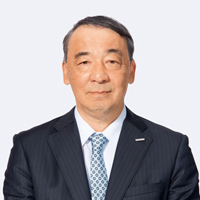 |
Chairman and Director Masaru Kawaguchi |
● | ● | ● | ● | ● | ● | 18/18 | |||||
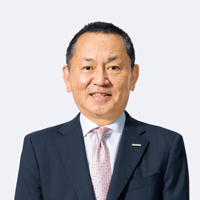 |
■ President and Representative Director, CEO Yuji Asako
|
● | ● | ● | ● | 18/18 | |||||||
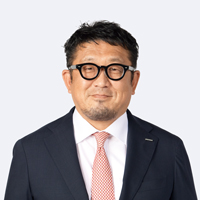 |
Executive Vice President and Director Nobuhiko Momoi
Director in charge of Group Strategy (CW360)
|
● | ● | ● | ● | 18/18 | |||||||
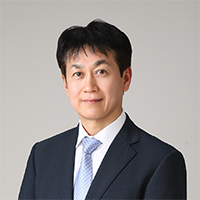 |
Director Takashi Tsuji
Division General Manager of Corporate Planning Division |
● | ● | ● | - | ||||||||
 |
Director Noriko Fujita
Division General Manager of Group Administrative Headquarters of the Company |
● | ● | ● | - | ||||||||
 |
Director (Part-time) Kazuhiro Takenaka
Director in charge of Toys and Hobby Unit
|
● | ● | ● | ● | 18/18 | |||||||
 |
Director (Part-time) Nao Udagawa
Director in charge of Digital Unit
|
● | ● | ● | ● | ● | ● | 18/18 | |||||
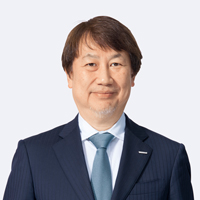 |
Director (Part-time) Makoto Asanuma
Director in charge of Visual and Music Unit
|
● | ● | ● | ● | ● | ● | ● | 18/18 | ||||
 |
Director (Part-time) Hiroshi Kawasaki
Director in charge of the Amusement Unit
|
● | ● | ● | ● | ● | ● | 18/18 | |||||
Note: Mr. Takashi Tsuji and Ms. Noriko Fujita were elected at the 20th Ordinary General Meeting of Shareholders held on June 23, 2025, and accordingly, the number of Board of Directors’ meetings on which the attendance rate is based differs from that of other directors.
■: Member of the Personnel Committee
| Job title Name |
Major concurrent positions |
Major experience and expertise | Independence | Attendance at meetings of the Board of Directors (FY2024) |
|||||||||||
|---|---|---|---|---|---|---|---|---|---|---|---|---|---|---|---|
| Corporate management |
Operational experience |
Finance, tax affairs, and accounting |
Sustainability | Internationality | Legal affairs |
Digital technology and information security |
Number of meetings attended/ Number of meetings held |
||||||||
| Digital | Toys and hobby |
Visual/ music |
IP creation/ development |
Facilities/machines | |||||||||||
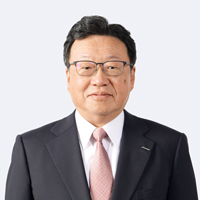 |
■■ Director (Part-time, outside) Toshio Shimada |
Special advisor of CAC Holdings Corporation Outside director of AEON DELIGHT CO., LTD. |
● | ● | ● | 18/18 | |||||||||
 |
■■ Director (Part-time, outside) Koichi Kawana |
Outside director of ispace, inc. Outside director of Kubota Corporation Chairman of RENOVA, Inc. |
● | ● | ● | ● | 17/18 | ||||||||
Note:Major concurrent positions are as of July 2024.
■: Member of the Personnel Committee
■: Member of the Independent Directors Committee
| Job title Name |
Major concurrent positions |
Major experience and expertise | Independence | Attendance at meetings of the Board of Directors (FY2024) |
|||||||||||
|---|---|---|---|---|---|---|---|---|---|---|---|---|---|---|---|
| Corporate management |
Operational experience |
Finance, tax affairs, and accounting |
Sustainability | Internationality | Legal affairs | Digital technology and information security |
Number of meetings attended/ Number of meetings held |
||||||||
| Digital | Toys and hobby |
Visual/ music |
IP creation/ development |
Facilities/ machines |
|||||||||||
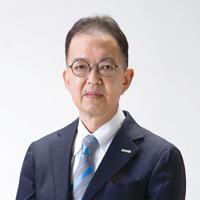 |
Director Takashi Kaneko |
● | 13/13 | ||||||||||||
 |
■ Director (Part-time, outside) Toru Shinoda |
Certified public accountant | ● | ● | 16/17 | ||||||||||
 |
■■ Director (Part-time, outside) Satoko Kuwabara |
Attorney-at-law partner of GAIEN PARTNERS Outside auditor of Unicafe Inc. Outside director of Mitsubishi UFJ Financial Group, Inc. Outside director of Nippon Yusen Kabushiki Kaisha |
● | ● | 17/17 | ||||||||||
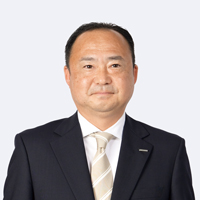 |
■ Director (Part-time, outside) Takayuki Komiya |
Certified public accountant Certified public tax accountant |
● | ● | ● | 17/17 | |||||||||
Note:
Major concurrent positions are as of June 2025.
Mr. Takashi Kaneko was elected at the 19th Ordinary General Meeting of Shareholders held on June 24, 2024, and accordingly, the number of Board of Directors’ meetings on which the attendance rate is based differs from that of other directors.
■: Member of the Personnel Committee
■: Member of the Independent Directors Committee
Policy and Procedures for Determining Director Remuneration
Basic Policy
The basic policy of the remuneration system for the Company’s directors (excluding Audit & Supervisory Committee members and outside directors) is to create a remuneration framework that promotes the Company’s continuous growth and improves the Company’s corporate value over the medium to long term by promoting the sharing of values with shareholders, ensuring objectivity and transparency so that the Company can adequately fulfill its accountability obligations, and fostering a healthy sense of entrepreneurship in the directors while taking into account the level of remuneration that will enable the Company to secure and retain top-grade personnel.
Specifically, the remuneration framework comprises the base remuneration as fixed remuneration and performance-based bonuses and performance-based stock compensation as variable remuneration. In addition, for the directors of the Group’s four business management companies (Bandai Co., Ltd., Bandai Namco Entertainment Inc., Bandai Namco Filmworks Inc., and Bandai Namco Experience Inc.) and the directors of Bandai Spirits Co., Ltd. and Bandai Namco Music Live Inc., the basic policy is the same as that of the Company.
Remuneration for the Company’s directors who are Audit & Supervisory Committee members and the Company’s outside directors comprises base remuneration only in light of their duties. The amount of remuneration for each director who is an Audit & Supervisory Committee member is determined through discussions among directors who are Audit & Supervisory Committee members, and the amount of remuneration for each outside director who is not an Audit & Supervisory Committee member is determined by the Board of Directors.
Fixed Remuneration (Base Remuneration)
The base remuneration for directors of the Company (excluding Audit & Supervisory Committee members) is monthly fixed remuneration paid in cash and paid within a specific time period every month. The limit is ¥600 million per year (including a maximum of ¥100 million for outside directors). In addition, Company directors (excluding Audit & Supervisory Committee members and outside directors) contribute a fixed proportion of the base remuneration to the shareholding association for directors and officers to purchase the Company’s shares. During his or her term of office, each director continues to hold such shares, as well as shares acquired through performance-based stock compensation. The base remuneration for directors who are Audit & Supervisory Committee members is monthly fixed remuneration paid in cash and paid within a specific time period every month, with the limit of ¥200 million per year.
Variable Remuneration (Performance-Based Bonuses and Performance-Based Stock Compensation)
As for variable remuneration for directors of the Company (excluding Audit & Supervisory Committee members and outside directors), both performance-based bonuses and performance-based stock compensation use consolidated operating profit of the Group as an indicator with the aim of directly reflecting the evaluation on management efforts by the management team of the Group in the amount of remuneration to be paid. At the same time, performance-based bonuses also use earnings per share (EPS) and the sustainability evaluation as indicators to promote further sharing of value with shareholders.
Performance-Based Bonuses
The payment rate is calculated within the range of 0% to 200% of a predetermined base amount, based on the achievement of multiple performance indicators for consolidated operating profit—the Group's Mid-term Plan targets, the fiscal year targets, and year-on-year comparisons—as well as the year-on-year comparison of EPS. Furthermore, the payment rate is increased or decreased based on the results of the sustainability evaluation. If the achievement rate is 50% or less, no performance-based bonus will be paid out.
The sustainability evaluation is aimed at motivating directors to contribute to sustainability and is based on the status of the Group's materiality indicators and targets (greenhouse gas emissions, employee engagement, etc.). The evaluation is first deliberated by the Personnel Committee, a voluntary body chaired by an independent outside director and composed of a majority of independent outside directors, and is ultimately decided by the Board of Directors.
The amount of performance-based bonuses is determined up to the lesser of either the annual cash bonus limit of ¥600 million or 1.5% of profit attributable to owners of parent, and will be paid each year at a specific time after the end of the applicable fiscal year.
Performance-Based Stock Compensation
Performance-based stock compensation is provided only when the Group’s consolidated operating profit is ¥100 billion or higher, and the payment ratio will be 100% if the consolidated operating profit reaches ¥200 billion (the target for the last fiscal year under the Mid-term Plan). Whether or not performance-based stock compensation will be paid and the level of payment is decided each fiscal year. Under the framework, the number of reference share units is predetermined for each officer rank, and shares of common stock of the Company and cash corresponding to the number of payment share units, which are finalized based on the degree of attainment of the consolidated operating profit target, will be delivered or paid. Additionally, payments will be made within two months from the day after the date of the Ordinary General Meeting of Shareholders for each fiscal year.
Furthermore, from April 2025, the scope of the performance-based stock compensation plan was expanded to include executive directors of domestic Group companies, who were not previously eligible, and a Group performance-based stock compensation plan was introduced. Under the plan, the Company's shares or money will be issued or paid to them when the Group’s consolidated operating profit meets a specified benchmark for each fiscal year.
Remuneration Structure
The Company determines the remuneration structure for directors of the Company (excluding Audit & Supervisory Committee members and outside directors) by verifying the level of remuneration based on its performance results and objective benchmarks for the management’s remuneration obtained from external specialist organizations and comprehensively taking into consideration the ratio of fixed remuneration to variable remuneration in the annual total remuneration and the ratio of medium- to long-term remuneration in variable remuneration. If the target for the final fiscal year under the Mid-term Plan has been achieved, the ratio of fixed remuneration to variable remuneration in annual total remuneration will be about 30:70. Also, the proportion in annual total remuneration of stock-based remuneration, that is, the sum of the contribution of a fixed proportion of the base remuneration to the shareholding association for directors and officers and performance-based stock compensation will be approximately 50%.
Procedure for Determining Compensation
The policy, framework, and performance-based mechanism for directors (excluding Audit & Supervisory Committee members and outside directors) will be determined by the Board of Directors after deliberation by the Personnel Committee, in order to seek the appropriate involvement and advice of the outside directors. In the course of deliberations by the Personnel Committee, sufficient information is provided to the outside directors so that they can perform their analysis, including, for instance, by asking for advice from external specialist organizations where necessary.
In regard to the method of calculating performance-based stock compensation, the matter is submitted to the Personnel Committee. A precondition is that among committee members, executive directors do not participate in deliberations regarding decisions on performance-based stock compensation. When all outside directors have agreed and made a decision on performance-based stock compensation, the decision is finalized through a resolution of the Board of Directors. In addition, at the business management companies, etc., in accordance with decisions based on the resolution of the Company’s Board of Directors, decisions are made through resolution of the Board of Directors of each of the business management companies, etc.
Succession Plan
The Company has set the term of office of directors (excluding Audit & Supervisory Committee members) at one year and reviews this annually to ensure the optimal system is in place. The Company has established internal rules on the retirement age of directors to build a system to promote the circulation of management. The Company has a unique program in place to systematically develop the next generation of executive leadership candidates. The planning and progress of this program are reported to the Board of Directors regularly to evaluate and make improvements based on discussions held by the Board of Directors.
The nomination of directors for the next representative directorship and new directorships involves the evaluation of directors and candidates by the Personnel Committee, which ensures a highly transparent and fair nomination system is in place for successors. The Personnel Committee is a voluntary committee chaired by an independent outside director, in which independent outside directors constitute a majority of its members.